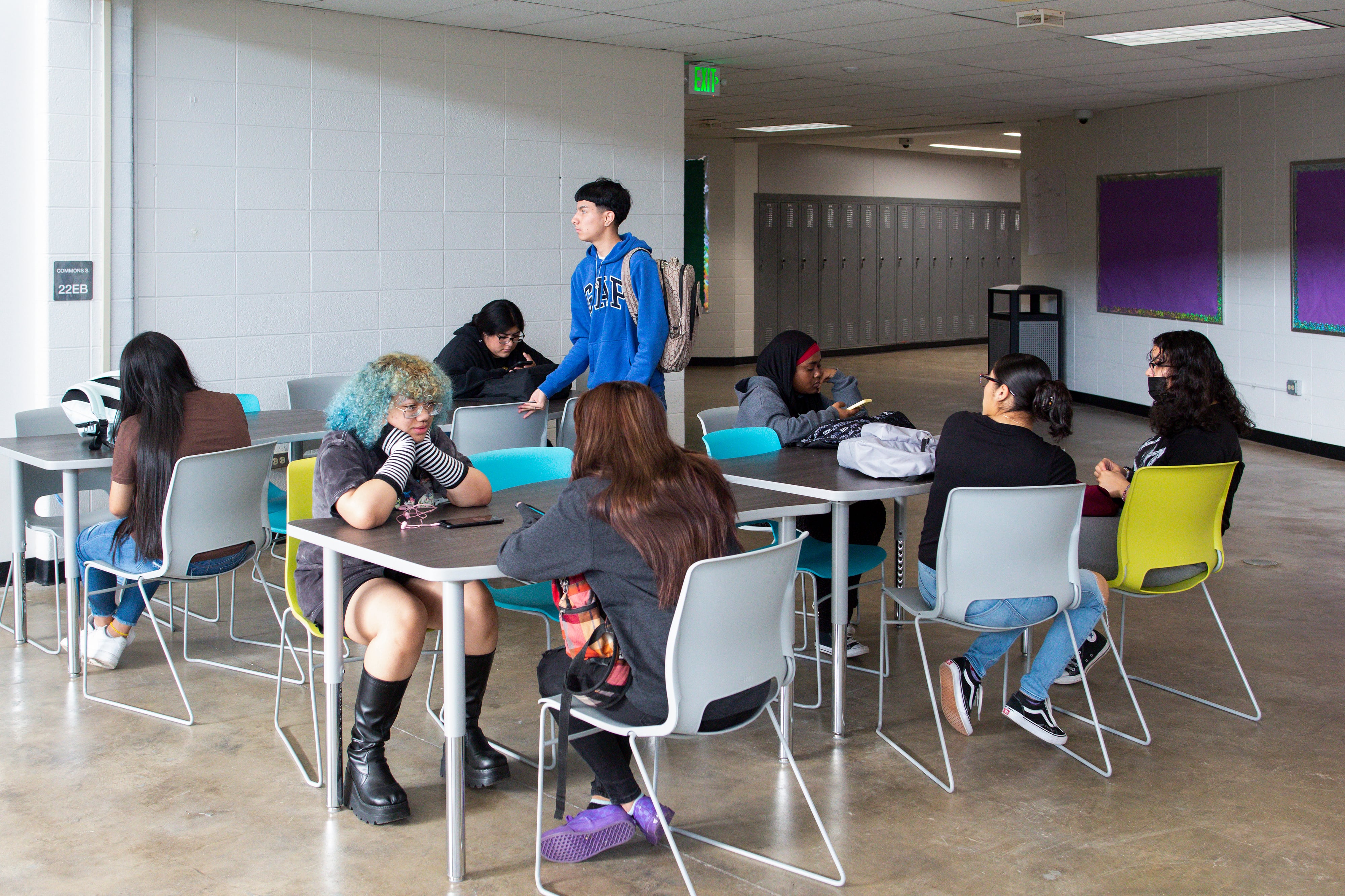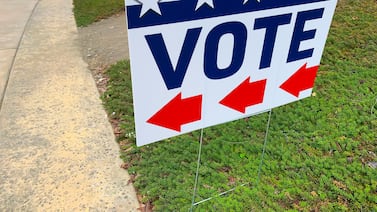Eight candidates are running for three open seats on the Denver school board at a time when gun violence around schools and infighting on the board has raised its profile in a critical way.
Some of the eight candidates said they decided to run after a March shooting inside East High School highlighted safety concerns in Denver Public Schools. Others were spurred by a rocky process to close schools with low enrollment, and still others are former DPS employees or longtime volunteers who said the timing was right for them this year.
At stake is how the board will deal with high-profile issues such as declining enrollment and the impacts of returning police officers to some high schools. The election also has the potential to change the dynamic among board members. Recent polls of parents and voters found widespread distrust and unfavorable views of the board.
Though several candidates said they want to see a change in how board members treat each other, the Nov. 7 election won’t shift the balance of power on the board. No matter the outcome, union-backed members will still hold a majority of seats on the board.
Six of the seven seats are currently held by members who were endorsed by the Denver teachers union as candidates. The seventh seat is occupied by a member who was appointed by the board to fill a vacancy last year.
The appointed member, Charmaine Lindsay, is running to keep her seat representing northwest Denver’s District 5. Lindsay, an attorney with grandchildren in DPS, has two challengers: longtime DPS volunteer Marlene De La Rosa and parent and former teacher Adam Slutzker.
Scott Baldermann, who was elected in 2019 to represent southeast Denver’s District 1, is the other incumbent in the race. Baldermann, a DPS parent who runs a small software company, has one challenger: parent and former charter school network CEO Kimberlee Sia.
The third seat up for grabs has no incumbent since board Vice President Auon’tai Anderson, who represents the entire city at large, dropped out of the race.
The at-large race has three candidates: parent and doctoral student Brittni Johnson, DPS graduate and bookstore owner Kwame Spearman, and parent and former East High principal John Youngquist. A fourth candidate, Paul Ballenger, dropped out of the race in late September.
Endorsements and fundraising so far
Endorsements from either the teachers union or education reform organizations have been key to winning in Denver. Both have deep pockets and spend big to support their chosen candidates.
The Denver Classroom Teachers Association has endorsed Spearman for the at-large seat. The union also endorsed Baldermann for reelection to the District 1 seat, and it endorsed Lindsay to keep her seat in District 5.
Meanwhile, pro-education reform organization Denver Families Action has endorsed Youngquist for the at-large seat, Sia for the District 1 seat, and De La Rosa for the District 5 seat.
Denver Families Action is the political arm of the nonprofit Denver Families for Public Schools. Denver Families launched in 2021 with the backing of local charter school networks and gets funding from The City Fund, a pro-reform national organization.
The teachers union often gives money directly to its slate of candidates and also funds an independent expenditure committee, which is a committee that can spend unlimited amounts of money but can’t coordinate with candidates. In the last election in 2021, the Denver and Colorado teachers unions spent more than $400,000 to back four candidates who won: Xóchitl “Sochi” Gaytán, Scott Esserman, Michelle Quattlebaum, and Carrie Olson.
Reform organizations funnel most of their money into independent expenditure committees. In 2021, reform-backed committees spent a little more than $1 million on mailers, digital ads, phone calls, text messages, and door knocking in support of three candidates who lost.
Spending by independent expenditure committees, which is sometimes referred to as outside spending or dark money, hasn’t yet ramped up this year. But many of the candidates themselves have been raising money, almost all of it from individual donors.
At-large candidate Spearman was the top fundraiser with about $59,000 as of Sept. 18, the date of the last campaign finance report filed with the Colorado Secretary of State. Youngquist, who’s also running at-large, and Sia, who’s running in District 1, were close behind with $57,000 each.
Current District 1 board member Baldermann had contributed $21,000 to his re-election campaign. He won in 2019 with the help of more than $330,000 of his own money, far more than any Denver candidate has contributed to their own campaign before or since.
Some candidates this year have raised very little money or none at all. Slutzker, who’s vying for the District 5 seat, hadn’t raised anything as of Sept. 18.
Where candidates stand on the issues
School board elections are nonpartisan, so candidates aren’t divided into Democrats and Republicans. Instead, Denver candidates’ views on education reform strategies, such as the expansion of independent charter schools within DPS, have historically divided them.
The teachers union generally opposes reform. Ever since the board flipped to union control in 2019, members have undone many reform policies. For example, board members reopened two comprehensive high schools, West and Montbello, that previous reform-backed boards closed for low test scores, which was a common reform strategy.
The board also approved a new labor union for principals, got rid of a controversial school ratings system, limited autonomy for district-run innovation schools, and rejected several new charter schools that applied to open in DPS.
Declining enrollment has also muted the reform debate, because even pro-reform candidates are hesitant to open new charter schools. Fourteen DPS charters have closed in the past four years, only one due to a board vote. The others closed on their own, largely because of declining enrollment.
The differences between pro-reform and anti-reform candidates are now subtler. Pro-reform candidates are more likely to defend school choice, which allows students to request to attend any school in the district. They are also more likely to say they support all DPS schools, regardless of type, as long as the schools are serving students well.
Anti-reform candidates are more likely to criticize the school choice system as broken and in need of improvement. They often say the district should prioritize supporting neighborhood schools, meaning traditional district-run schools, before approving new charters.
The school board race where the differences are starkest this year is in District 1. Sia is the former CEO of the KIPP Colorado charter school network and a strong supporter of school choice. Baldermann is the board’s harshest critic of school choice and charters.
Another high-profile topic on which some board members disagree is the reinstatement of school resource officers. While most candidates support SROs, Slutzker and Johnson said at a recent forum hosted by the DPS Black Family Advisory Council that they would have voted no.
On many other topics, the candidates agree. Most candidates have acknowledged that declining enrollment may require some schools to be closed, but that DPS should do a better job including families, teachers, and community members in that decision making.
Many candidates also agree that DPS should prioritize hiring and retaining educators of color and closing test score gaps between Black and Hispanic students and white students.
Editor’s note: This story has been updated to reflect that Paul Ballenger dropped out of the race for the at-large seat in late September. It has also been updated with endorsements.
Melanie Asmar is a senior reporter for Chalkbeat Colorado, covering Denver Public Schools. Contact Melanie at masmar@chalkbeat.org.






